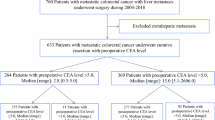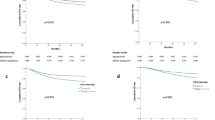Abstract
Background
Serum carcinoembryonic antigen (CEA) increase in patients with colorectal cancer (CRC) recurrence was observed to vary depending on their initial values. This study aimed to evaluate the diagnostic accuracy of CEA for detecting CRC recurrence in patients with normal and elevated initial CEA levels.
Methods
A total of 261 CRC recurrence patients who underwent curative resection were included and divided into two groups, normal and elevated initial CEA. Analysis was performed comparing patient, tumor, and recurrence characteristics retrospectively.
Results
There were 192 patients with normal and 69 with high initial CEA levels. Patient and tumor characteristics were similar. Eighty-six patients had elevated CEA at the time of recurrence, and the overall sensitivity of CEA for recurrence was 33.0%. In the high initial CEA group, 59.4% exhibited increased CEA level at recurrence, whereas in patients with normal initial CEA levels, only 23.4% showed elevated levels (p < 0.001). Patients with both high CEA preoperatively and at recurrence had more local recurrence, but there was no statistical significance (p = 0.053), and the rate of lung metastasis was higher in patients whose CEA remained normal at recurrence (38.3% vs. 24.4%, p = 0.026). The overall survival of patients with elevated CEA at recurrence was worse than those with normal CEA levels (56.9% vs. 42.4%, p = 0.003).
Conclusion
The diagnostic accuracy of CEA for detecting recurrence depends on initial CEA level. Regardless of the initial CEA level, elevation at recurrence was significantly associated with overall survival in patients with recurrent CRC.


Similar content being viewed by others
Data Availability
The participants of this study did not give written consent for their data to be shared publicly, so due to the sensitive nature of the research supporting data is not available.
References
Tan E, Gouvas N, Nicholls RJ, et al. Diagnostic precision of carcinoembryonic antigen in the detection of recurrence of colorectal cancer. Surg Oncol. 2009;18(1):15-24. https://doi.org/10.1016/j.suronc.2008.05.008
Newton KF, Newman W, Hill J. Review of biomarkers in colorectal cancer. Colorectal Dis. 2012;14(1):3-17. https://doi.org/10.1111/j.1463-1318.2010.02439.x
Fang MY, Wang SY, Zheng YB, et al. Prognostic and predictive significance of plasma hepatocyte growth factor and carcinoembryonic antigen in non-small lung cancer after surgery. Eur Rev Med Pharmacol Sci. 2014;18(3):398-403.
Kang HY, Choe EK, Park KJ, et al. Factors Requiring Adjustment in the Interpretation of Serum Carcinoembryonic Antigen: A Cross-Sectional Study of 18,131 Healthy Nonsmokers. Gastroenterol Res Pract. 2017;2017:9858931. https://doi.org/10.1155/2017/9858931
Lu J, Wang H, Zhang X, et al. HbA1c is Positively Associated with Serum Carcinoembryonic Antigen (CEA) in Patients with Diabetes: A Cross-Sectional Study. Diabetes Ther. 2018;9(1):209-217. https://doi.org/10.1007/s13300-017-0356-2
Huang CS, Chen CY, Huang LK, et al. Prognostic value of postoperative serum carcinoembryonic antigen levels in colorectal cancer patients who smoke. PLoS One. 2020;15(6):e0233687. https://doi.org/10.1371/journal.pone.0233687
Moertel CG, O'Fallon JR, Go VL, et al. The preoperative carcinoembryonic antigen test in the diagnosis, staging, and prognosis of colorectal cancer. Cancer. 1986;58(3):603-610. https://doi.org/10.1002/1097-0142(19860801)58:3<603::aid-cncr2820580302>3.0.co;2-k
Sharma S. Tumor markers in clinical practice: General principles and guidelines. Indian J Med Paediatr Oncol. 2009;30(1):1-8. https://doi.org/10.4103/0971-5851.56328
Thirunavukarasu P, Talati C, Munjal S, et al. Effect of Incorporation of Pretreatment Serum Carcinoembryonic Antigen Levels Into AJCC Staging for Colon Cancer on 5-Year Survival. JAMA Surg. 2015;150(8):747-755. https://doi.org/10.1001/jamasurg.2015.0871
Becerra AZ, Probst CP, Tejani MA, et al. Evaluating the Prognostic Role of Elevated Preoperative Carcinoembryonic Antigen Levels in Colon Cancer Patients: Results from the National Cancer Database. Ann Surg Oncol. 2016;23(5):1554-1561. https://doi.org/10.1245/s10434-015-5014-1
Das V, Kalita J, Pal M. Predictive and prognostic biomarkers in colorectal cancer: A systematic review of recent advances and challenges. Biomed Pharmacother. 2017;87:8-19. https://doi.org/10.1016/j.biopha.2016.12.064
Yoshikawa M, Morine Y, Ikemoto T, et al. Elevated Preoperative Serum CEA Level Is Associated with Poor Prognosis in Patients with Hepatocellular Carcinoma Through the Epithelial-Mesenchymal Transition. Anticancer Res. 2017;37(3):1169-1175. https://doi.org/10.21873/anticanres.11430
Konishi T, Shimada Y, Hsu M, et al. Association of Preoperative and Postoperative Serum Carcinoembryonic Antigen and Colon Cancer Outcome. JAMA Oncol. 2018;4(3):309-315. https://doi.org/10.1001/jamaoncol.2017.4420
Huang SH, Tsai WS, You JF, et al. Preoperative Carcinoembryonic Antigen as a Poor Prognostic Factor in Stage I-III Colorectal Cancer After Curative-Intent Resection: A Propensity Score Matching Analysis. Ann Surg Oncol. 2019;26(6):1685-1694. https://doi.org/10.1245/s10434-019-07184-3
Ramphal W, Boeding JRE, van Iwaarden M, et al. Serum carcinoembryonic antigen to predict recurrence in the follow-up of patients with colorectal cancer. Int J Biol Markers. 2019;34(1):60-68. https://doi.org/10.1177/1724600818820679
Su BB, Shi H, Wan J. Role of serum carcinoembryonic antigen in the detection of colorectal cancer before and after surgical resection. World J Gastroenterol. 2012;18(17):2121-2126. https://doi.org/10.3748/wjg.v18.i17.2121
Locker GY, Hamilton S, Harris J, et al. ASCO 2006 update of recommendations for the use of tumor markers in gastrointestinal cancer. J Clin Oncol. 2006;24(33):5313-5327. https://doi.org/10.1200/JCO.2006.08.2644
Duffy MJ, Lamerz R, Haglund C, et al. Tumor markers in colorectal cancer, gastric cancer and gastrointestinal stromal cancers: European group on tumor markers 2014 guidelines update. Int J Cancer. 2014;134(11):2513-2522. https://doi.org/10.1002/ijc.28384
National Institute for Health and Care Excellence Colorectal Cancer: Diagnosis and Management NICE Clinical Guideline 2020;151. https://www.niceorguk/guidance/ng151. Accessed 15 Dec 2021
Argiles G, Tabernero J, Labianca R, et al. Localised colon cancer: ESMO Clinical Practice Guidelines for diagnosis, treatment and follow-up. Ann Oncol. 2020;31(10):1291-1305. https://doi.org/10.1016/j.annonc.2020.06.022
Benson AB, Venook AP, Al-Hawary MM, et al. Colon Cancer, Version 2.2021, NCCN Clinical Practice Guidelines in Oncology. J Natl Compr Canc Netw. 2021;19(3):329-359. https://doi.org/10.6004/jnccn.2021.0012
Moertel CG, Fleming TR, Macdonald JS, et al. An evaluation of the carcinoembryonic antigen (CEA) test for monitoring patients with resected colon cancer. JAMA. 1993;270(8):943-947.
Chen CC, Yang SH, Lin JK, et al. Is it reasonable to add preoperative serum level of CEA and CA19-9 to staging for colorectal cancer? J Surg Res. 2005;124(2):169-174. https://doi.org/10.1016/j.jss.2004.08.013
Park IJ, Choi GS, Lim KH, et al. Serum carcinoembryonic antigen monitoring after curative resection for colorectal cancer: clinical significance of the preoperative level. Ann Surg Oncol. 2009;16(11):3087-3093. https://doi.org/10.1245/s10434-009-0625-z
Khan MA, Maken RN, Nisar H, et al. THE Role of Preoperative carcinoembryonic antigen in recurrence of resectable colorectal carcinoma. Acta Clin Croat. 2020;59(2):216-222. https://doi.org/10.20471/acc.2020.59.02.03
Glynne-Jones R, Wyrwicz L, Tiret E, et al. Rectal cancer: ESMO Clinical Practice Guidelines for diagnosis, treatment and follow-up. Ann Oncol. 2017;28(suppl_4):iv22-iv40. https://doi.org/10.1093/annonc/mdx224
Baek SJ, Kim SH, Kwak JM, et al. Selective use of preoperative chemoradiotherapy for T3 rectal cancer can be justified: analysis of local recurrence. World J Surg. 2013;37(1):220-226. https://doi.org/10.1007/s00268-012-1792-9
McCall JL, Black RB, Rich CA, et al. The value of serum carcinoembryonic antigen in predicting recurrent disease following curative resection of colorectal cancer. Dis Colon Rectum. 1994;37(9):875-881. https://doi.org/10.1007/BF02052591
Shinkins B, Primrose JN, Pugh SA, et al. Serum carcinoembryonic antigen trends for diagnosing colorectal cancer recurrence in the FACS randomized clinical trial. Br J Surg. 2018;105(6):658-662. https://doi.org/10.1002/bjs.10819
Michl M, Koch J, Laubender RP, et al. Tumor markers CEA and CA 19-9 correlate with radiological imaging in metastatic colorectal cancer patients receiving first-line chemotherapy. Tumour Biol. 2014;35(10):10121-10127. https://doi.org/10.1007/s13277-014-2280-7
Author information
Authors and Affiliations
Contributions
SJB mainly provided the main conceptualization, and THL wrote this manuscript; and JSK, JMK, and JK reviewed the paper.
Corresponding author
Ethics declarations
Conflict of Interest
The authors declare no competing interests.
Additional information
Publisher's Note
Springer Nature remains neutral with regard to jurisdictional claims in published maps and institutional affiliations.
Rights and permissions
Springer Nature or its licensor (e.g. a society or other partner) holds exclusive rights to this article under a publishing agreement with the author(s) or other rightsholder(s); author self-archiving of the accepted manuscript version of this article is solely governed by the terms of such publishing agreement and applicable law.
About this article
Cite this article
Lee, TH., Kim, JS., Baek, SJ. et al. Diagnostic Accuracy of Carcinoembryonic Antigen (CEA) in Detecting Colorectal Cancer Recurrence Depending on Its Preoperative Level. J Gastrointest Surg 27, 1694–1701 (2023). https://doi.org/10.1007/s11605-023-05761-2
Received:
Accepted:
Published:
Issue Date:
DOI: https://doi.org/10.1007/s11605-023-05761-2




